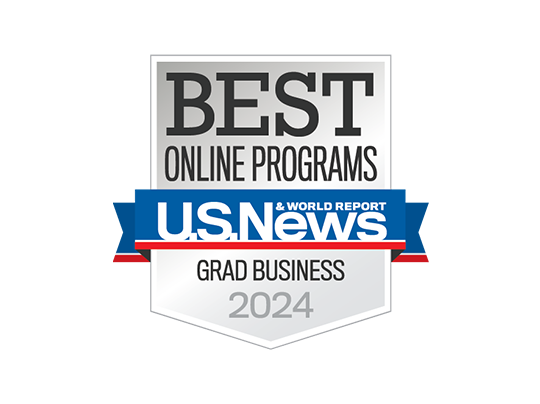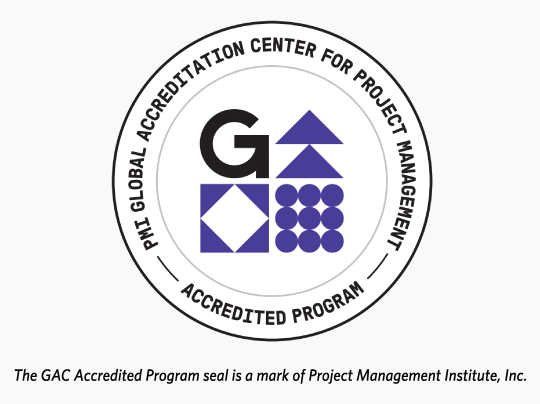What Is the Career Outlook with an MS in Project Management from BU MET?
One of the modern job economy’s most in-demand careers is that of the project manager. Among the most important elements to the success of any enterprise is the quality of its project management. Businesses are built on their capacity to deliver, and delivering is reliant on the successful blending of organization, team cohesion, clarity, and timeliness—each attributable to the capability of a team’s project manager.
Project management is a field replete with professional prospects, with the Project Management Institute (PMI) forecasting that 2.3 million project managers will be needed each year to fill all related career positions expected to open by 2030.
Earning a master’s degree in project management is a proven path towards a fruitful career. According to a 2023 PMI survey, the median salary for a project management specialist is $120,000—with opportunities in sectors ranging from engineering to management, computer systems, the sciences, marketing, and architecture and construction, among countless others. The career also boasts a faster-than-average job outlook, with the US Bureau of Labor Statistics projecting a 6 percent rate of growth projected through 2032.
Accredited since 2006 by the PMI Global Accreditation Center for Project Management Education Programs (GAC), the Master of Science in Project Management at Boston University’s Metropolitan College (BU MET) has helped scores of students develop the project management skills they need to either advance in their career or enter the field. At BU MET, you’ll develop qualities in collaborative leadership, problem-solving, communication, and strategic thinking under the tutelage of professors who possess a wealth of applied knowledge of the field.
“Project leaders and project associates are required in every industry, and they will continue to play an essential role,” says Associate Professor Vijay Kanabar, director of Project Management Programs at BU MET.
As a PMI-certified Project Management Professional (PMP)® and Certified ScrumMaster® (CSM®), Dr. Kanabar has advised numerous organizations on training and technology needs, including Blue Cross Blue Shield, Staples, United Way, and Fidelity Investments. He’s mentored generations of aspiring project managers, helping them achieve their professional certifications through optional, complimentary PMP® exam preparation courses offered by BU MET. (“PMP” is a registered mark of Project Management Institute, Inc.)
A Project Management Degree Focused on Applicable Skills
For Anne Marie Kelley (MET’18), who earned an MS in Project Management at BU MET and is now the project management office manager at Walpole, Massachusetts-based manufacturer Hollingsworth & Vose, applicability was the most-valued aspect of her BU project management education. “I really wanted to take the opportunity to make class assignments as pertinent to my real job as possible, so I was intrigued by learning how to look at what I do on a daily basis through a more analytical lens, to see how I was applying (or not applying) best practices in my work and trying to figure out how to do my work better based on what I was learning,” she says.
Kelley discovered that her professional development was reliant on her ability to combine capabilities. “Project management is an area of expertise that blends hard and soft skills,” she observes. “It requires having good analytical abilities and an understanding of how to quantify, qualify, and present information about a project from a business perspective.”
This blend is key to many jobs in project management, which demands cross-functional teamwork and capacity for leadership. “[Project management] also requires strong communication and interpersonal skills,” Kelley says. “I get to work with a lot of different people, both from the business side and from the technology side, to solve business problems using technology.”
Today, she counts herself lucky for the coursework she completed while earning her Master of Science in Project Management at Boston University’s Metropolitan College. “There are a lot of takeaways from my courses that I use in my work. I love to use the ‘power and influence grid’ when starting up my projects, to categorize the stakeholders and determine how and what I need to communicate to the different groups,” she attests.
- Learn more about the Master of Science in Project Management.
Lifelong Learning through Project Management
The master’s degree program in project management offered by BU’s Metropolitan College is offered in a part-time format, both on campus and online—so you can complete your education while maintaining your full-time career. This flexibility can be vital to helping you develop skills you can immediately apply on the job, allowing you to grow in your career even as you simultaneously pursue your education.

#6, Best Online Master's in Business Programs (Excluding MBA)
MET’s online master’s degrees in management are ranked #6 in the nation by U.S. News & World Report for 2024.
Learn More
PMI Global Accreditation Center for Project Management
BU MET’s MS in Project Management and MS in Computer Information Systems concentration in IT Project Management are accredited by the Project Management Institute Global Accreditation Center for Project Management Education Programs (GAC).
Learn MoreAn ongoing education, wherein you continually refine and discover new tools, is increasingly crucial to career development. BU MET’s project management master’s degree program can be an asset no matter how far along you are in your professional development.
James Katzen (MET’13) already had his MBA when he enrolled in the project management master’s program. “I wanted to return to university to learn about the latest tools, standards, and techniques that are in use,” he says. For him, the investment paid off. “On a daily basis, I am involved in leadership and participation of complex programs and projects, and having an improved toolkit is valuable to me.”
Sometimes, a graduate education in project management at BU MET can be born of a need for a jump-start. “I was looking at the market and said to myself, ‘How can I make myself more competitive?’” says Terry Robbins, who accomplished that goal at BU MET, earning his MS in Project Management in 2012.
MET’s project management master’s degree program helps project managers all of all stripes develop in their careers. Take Albrik Avanessian (MET’22), for example. A systems and networking program project manager employed by BU’s Information Services & Technology, at 60-plus years he is more experienced than most graduate students. Yet, he nonetheless found value in devoting himself to project management degree studies, completing a directed study project on adaptability and resilience to change. The project gave the experienced Avanessian even more complementary tools.
“A huge part of a project manager’s job is to be patient,” Avanessian says. “I try to approach everything patiently, figuring out what can derail a project before it gets to that point.”
Project Success through Communication
Paramount to project success is communication. It’s a specialty of Master Lecturer Richard Maltzman, who ended up in what he calls the “accidental profession” of project management after pivoting from electrical engineering 10 years into his 40-year career. “I have a passion for transferring knowledge in this area, in particular so that students have greater, and more sustainable, success with their projects, and so that they can make this their ‘intentional profession,’” he says.
One notable course Maltzman teaches is Project Communications and Leadership (MET AD 643), where his students learn what it takes to be a strong leader and an effective communicator. In it, Maltzman introduces a number of current project management philosophies of leadership, demonstrating ways to succeed across different modes of communication, conflict management and resolution, and negotiation.
For Johnny Luk (MET’16), a PMI Agile Certified Practitioner (PMI-ACP)® and Professional Scrum MasterTM I (PSM I) who is employed as an agile coach for the LEGO Group, communication and negotiation skills contribute to his ability to do his job well. “I deal directly with clients, and, occasionally, I must ‘arm wrestle’ with them,” he explains, citing that certain scenarios make it difficult to provide clients with clear answers.
“It is about giving the most suitable solution in the particular situation,” he says. “As Dr. Vijay Kanabar . . . teaches, negotiation and communication are the two most important factors to project success.”
Project Management Career Connections that Count
One of the key advantages of joining a BU MET degree program is the connections you will make, which can have a big impact on your professional life. Take O’Shea Bridges (MET’19), who earned his MS in Computer Information Systems with a concentration in IT Project Management. He cites his experiences with his peers in the classroom as one of the major advantages of studying at BU MET. “Networking with your fellow students is pivotal when taking graduate courses at BU,” he says. “I was able to create friendships and contacts in the technology industry by networking with my classmates in class.”
An associate at McKinsey & Company who previously served as a systems engineer in Lockheed Martin’s Engineering Leadership Development Program, Bridges’ time at BU forged connections that directly benefitted his professional life. “I learned about technology offered at a classmate’s company that my organization may now leverage to improve our own products and processes,” he says.
Launchpad to a Project Management Career
BU MET sets students up for success by putting them in a favorable position to land competitive business internships. For instance, if you choose to take the Administrative Sciences elective course AD Internship I (MET AD 508), you can spend a semester working, either part- or full-time, in an off-campus organization related to your field of study. Under the supervision of a faculty member, you get the benefit of taking part in a transformative career experience that puts your skills to the test on the job. The connections you make, both with faculty and with host companies, can be beneficial and transformative to your career.
When you pursue your Master of Science in Project Management at BU MET, you also gain access to the College’s invaluable Office of Career Development, which offers myriad one-on-one tools, including career counseling, interview and online résumé coaching, cover letter reviews, and job search coaching. You can also take advantage of BU’s Center for Career Development, as well as the University’s powerful job search tool Handshake, both of which activate the power of Boston University’s extensive global network of professionals.
If your motivation is to take a significant leap forward in your project management career, whether you are a career changer, seeking to bolster the skills you already utilize on the job, or are entering the job market, Boston University Metropolitan College’s Master of Science in Project Management is here for your benefit. Established in 2005 as one of the first programs of its kind, BU’s MS in Project Management is a proven course of study that has aided professionals in achieving their individual goals.
What to Read Next: MET Project Management Knowledge Center
- How Long Does a Master’s in Project Management Take to Complete—and What is the Cost?
- Why Choose a Master of Science in Project Management at BU MET?
- Are There Different Project Management Graduate Programs or Specializations at BU?
- What Is the Career Outlook with an MS in Project Management from BU MET?
